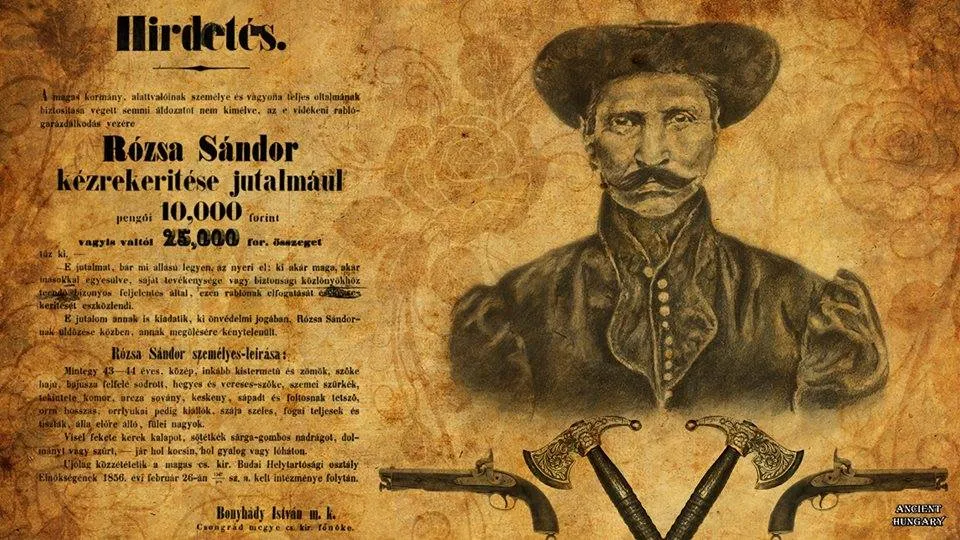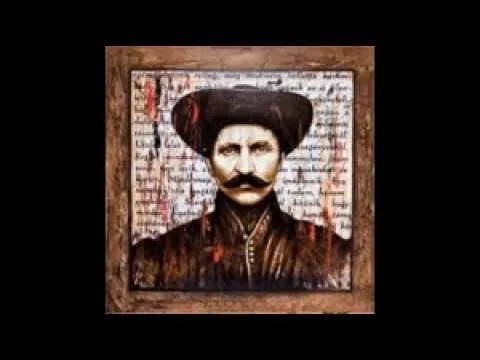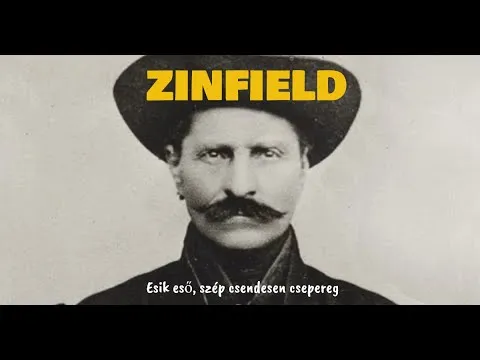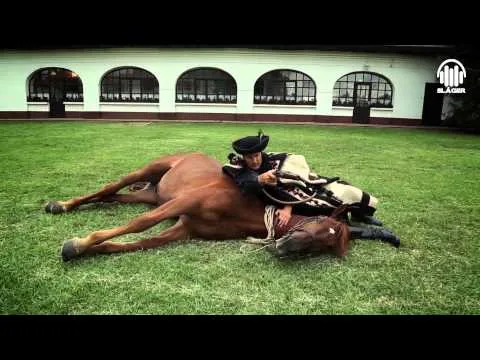It is typically the other way round: people in the middle of the Carpathian Basin dream of palm trees, sunglasses, and cool motorcycles, just as California is known to be presented on TV. At the moment I find myself pretty much in this scenario (though instead of Santa Monica it's the mountains of San Bernardino, it is pretty much the same), and ironically I get to foster another fantasy: one of goulash, paprika, and fearless horse hands in wide pants and shirts, riding across the vast Hungarian plains.
Inspired by all this mix of clichés and folk legends, I want to present a well known Hungarian folk song, which is rooted in history but has reached mythical proportions. It is titled Esik Eső (the rain is falling), or simply the Rósza Sándor song, and it is about a famous 19th century outlaw, often described as the Hungarian Robin Hood.
Who Was This Man?
Once you strip away the legend, all that remains is just one of many poor fellows who took the law into their own hands, responding to the oppressive injustice of the powers that have been (and still are, in a way). Living on the Great Hungarian Plains, they were mostly mounted herders of horses and cattle, which gave them the possibility to cover great distances in relatively short time. In spite of being criminals and therefor constantly on the run from the law, they tended to enjoy great popularity among the locals, for supporting them with much of the loot they've taken, as well as defending them from physical injustice whenever they could. In return they would offer them hiding places or notify them of approaching gendarmes. - At the same time, I'm sure even among these so called "betyárs" (a word related to bachelor but meaning highwayman or outlaw) there had to be genuine bad apples, so I will try not to immerse myself in the myth - yet.
So how did Rózsa Sándor (Alexander Rose in English) become the best known Hungarian betyár? Good question, because his case is really quite a typical one. Witnessing as a child how his father was hanged for stealing a horse, he soon turned to crime himself, embarking on a lifetime outside the law. A series of robbery and thievery eventually led to his conviction, followed by jail breaks and further captures. During the Hungarian war for independence he was granted amnesty and organized his own free unit of like minded former outlaws. Afterwards, however, he continued to be persecuted, so in spite of getting married and settling down as a legitimate horse hand, he once again turned to crime. As one of his last great feats he is credited with the first train robbery in Europe, before being locked up for good in the prison fortress of Kufstein, where he became a bit of an exhibition item of curious gawkers wanting to see the famous outlaw.
The Songs They Wrote About Him
The song itself is a very simple one, telling the tale of his capture. As it tends to be the case with folk poetry, various verses have been added, taken away, and changed, raising the spectacular story to further heights. For taking the side of the proletariat in the great class struggle, he was at least not vilified during the communist era, in spite of being a criminal. For representing Hungarian self determination, bravery, and honest values, he has also become an important icon in nationalistic lore. Here I want to show my favorite interpretations of the song about Rózsa Sándor:
This first one is a beautiful instrumental version of the song, performed on the zither, an important instrument in Hungarian music I discussed in my first Monday Music post. The accompanying images include the few actual photos taken of this man that became a kind of myth.
After the traditional, let's bring on the rock! I like this version by Zinfield, not only because of it's good combination of metal and folk music, but because of a very comprehensive audiovisual experience they have created in their interpretation of this old song. Interestingly, they also include the lyrics, in proper Hungarian. I should mention that many performers like to sing the words in the dialect of the Szeged region (where both Rózsa Sándor and my family are from). However, since it is known to be a tricky dialect for outsiders to learn, more often than not this attempt makes native Szegedians like myself cringe in our boots. So thank you Zinfield for sticking to the standard pronunciation.
My favorite version by far is another instrumental interpretation by the folk band Ördögfű. What makes this so amazing, is their use of ancient Hungarian instruments. Unlike more sophisticated traditional instruments, such as the zither, these sounds are created in the most basic ways, and are therefor probably the oldest folk instruments in Hungarian culture: They include flutes that were nothing more than a simple pipe, or the famous "jug-pipe", a skin covered jug with a stick poking through, producing rubbery reverberations when you moved the stick up and down. For me these sounds create an incredibly magical feeling, going much deeper than stories about outlaws. The imagery it uses in the background further amplify this feeling.
Finally, I want to leave you with a "horrible" version by Laci Betyár, apparently a recent phenomenon in the still popular Hungarian genre of wedding rock. It's his official music video, where he unabashedly makes use of various folk clichés. While deep in the realm of the cringeworthy, I have to admit that he does have a certain style, for which he deserves credit. Also, I'm glad to hear he also avoids the Szegedian dialect, since he is obviously not from that region.
With all this imagery of Hungarian outlaws, I should have a rich repertoire of Hungarian dreaming for Californians. Whether it is the right stuff for the dream factory is to be determined still, but since culture tends to amalgamate numerous elements from various sources, there is a good chance for both incorporating and mixing up the old with the new, and the inside with the outside.





